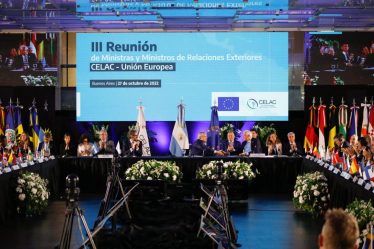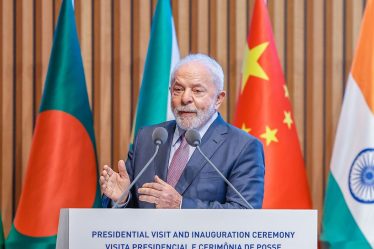
[English below]
Nesta semana, o Observatório de Regionalismo compartilha a entrevista realizada com o professor Dr. Thomas Risse, professor de Ciência Política na Freie Universität Berlim, diretor do grupo de pesquisa “The Kolleg-Forschergruppe (KFG) “The Transformative Power of Europe” e coordenador do Centro de Pesquisa Colaborativa (SFB) 700 ”Governance in Areas of Limited Statehood”. Na ocasião, o professor comentou 4 tópicos de suas pesquisas: regionalismo comparado, governança global, identidade e regionalismo, e difusão de regionalismos e normas. A entrevista está imperdível, disponibilizada como podcast, em inglês, e aqui transcrita em inglês e português. Agradecemos ao professor Risse pela oportunidade, não deixem de conferir!
Entrevista realizada por Clarissa Ribeiro. Tradução nossa, transcrição editada para clareza.
Clarissa Ribeiro (C.R.): O Observatório de Regionalismo agradece muito ao Professor Risse pela sua entrevista e, para esta entrevista, gostaríamos de falar sobre quatro tópicos principais que são de suas pesquisas: primeiro Regionalismo Comparativo, então Governança Global, Identidade e Regionalismo e a Difusão do regionalismo e das normas. Assim, recentemente, o senhor e a professora Tanja Börzel publicaram um livro, “The Oxford Handbook of Comparative Regionalism.” Qual é a importância de levantar este debate?
Thomas Risse (T.R.): Penso que a principal questão é realmente envolver-se no regionalismo comparativo. Há muitos estudos, ou tem havido muitos estudos, olhando para diferentes regiões e então você tem essas pessoas na enorme comunidade que estuda a União Européia e pensam que a União Européia é o único que existe e o resto é irrelevante. E você tem uma comunidade de africanistas olhando para as regiões africanas e assim por diante. Então, pensamos que o que devemos fazer é realmente forçar nossos autores a olhar para através das regiões. Nós ainda temos capítulos sobre vários continentes, mas nesse manual que você mencionou, a principal ênfase é realmente comparar em todas as regiões porque você pode aprender muito sobre quais são os principais impulsionadores do regionalismo no surgimento de organizações regionais, entende? Quais são realmente os efeitos deles? Eles têm algum efeito? É apenas discurso? E assim por diante. Você só pode apresentar alguns fatores explicativos se você comparar, e essa é a beleza do regionalismo comparativo. De certa forma, é Ciências Sociais básicas, porque as Ciências Sociais são justamente comparações.
C.R.: Sobre a governança global: quais funções as regiões desempenham agora em nosso sistema para alcançar a governança global?
T.R.: Em primeiro lugar, a maioria das organizações regionais são organizações de governança regional. Elas se envolvem em diversas áreas, seja a segurança, seja a governança econômica, seja clima, governança ambiental, governança dos direitos humanos … Quero dizer, na área de direitos humanos, temos todos os tipos de regimes de direitos humanos humanos e às vezes isso funciona como uma espécie de implementação de regimes globais maiores. Portanto, na área de direitos humanos, este, definitivamente, é o caso. Você possui regimes globais de direitos humanos e, então, você tem, particularmente nas Américas e na Europa, um regime regional de direitos humanos muito forte que implementa essas normas globais no contexto regional, podendo também ser bem mais específico para os contextos. Mas também há casos, pelo contrário, onde as organizações regionais trabalham com objetivos opostos à governança global. Existe um debate em curso sobre se as organizações econômicas regionais realmente desviam o comércio ou fomentam o comércio. Ou se eles são compatíveis com as regras da OMC, e etcétera, de modo que é um debate em curso. A maioria das evidências sugere que, inicialmente, são iniciativas complementares. Só porque você tem um mercado único muito forte na Europa não significa que a Europa não realiza comércio com o resto do mundo. Portanto, há poucas evidências para o desvio do comércio, mas é um debate em curso. Em alguns casos, promove regimes globais de governança e, em outros casos, funciona contra isso.
C.R: No seu ponto de vista, como essas questões de identidade influenciam o desenvolvimento do regionalismo?
T.R.: Na verdade, essa é uma questão muito complicada porque não se pode dizer que identidades regionais fortes se traduzem imediatamente em instituições regionais. Muitas organizações regionais são baseadas nos chamados “contratos abertos”. Pense na União Europeia, é um contrato aberto. Está evoluindo, está sempre evoluindo. (…) O meu ponto seria: se você não tem um senso de comunidade regional – e isso é identidade – esse fim aberto não é viável porque você não pode confiar em seus parceiros que, na verdade, isso está aberto no futuro. Então, para isso, você precisa de algum tipo de espírito comunitário. Não estamos falando de identificações muito fortes com a região e, de certa forma, as pessoas têm diferentes identidades múltiplas. Você sabe, você pode ser brasileiro. Você pode ser de São Paulo, você é “Paulista” e você pode ter uma identificação com o oeste… Eu não sei sobre uma identidade latino-americana que é uma história diferente – acho que é algo bastante fraco – mas também pode se identificar com o seu com a sua região. E os dados que nós temos para a Europa, mostram que mesmo as pessoas que apenas têm uma ligação mínima com a região, estão apoiando fortemente a integração européia, muito mais do que as pessoas que só se identificam com suas próprias nações. Por isso, não precisamos de identidades “morreria-pela-Europa”, a fim de manter a integração regional funcionando. Este é um ponto: temos algumas boas evidências de que as identidades dos cidadãos têm algo a ver com a capacidade das elites políticas para realmente promover a integração regional. E o segundo ponto é – e isso é apenas uma observação e nós realmente não sabemos o efeito que tem – em quase todos os casos de construção da região, as elites políticas fazem esse esforço sustentado na criação da identidade regional. Cria-se uma bandeira para a organização regional e o simbolismo. Na África, eles falam sobre a maneira africana e é a construção da comunidade. Na ASEAN estabeleceram a Asean way, distanciando-se da Europa e assim por diante. Então, as elites, quando eles se envolvem na construção da região, quase inevitavelmente falam sobre identidade. E não se trata apenas de interesses econômicos. É quase sempre sobre identidade. Infelizmente, não sabemos quais são os efeitos disso; sobretudo nos dados ou estudos da Europa – onde temos os melhores dados disponíveis – é muito difícil mostrar que a integração européia, o próprio processo teve efeitos sobre a identificação popular. É muito difícil de mostrar e, no momento, eu apostaria que o caminho é mais da identidade para a integração regional do que o contrário. Pode ser uma espécie de círculo virtuoso com efeito de feedback. Mas o efeito das identidades regionais ou a identificação com a região, a construção regional é provavelmente mais forte do que o contrário.
C.R.: E nossa última pergunta é sobre difusão. O senhor produziu diversos trabalhos sobre difusão, vários realmente importantes para o campo. Gostaríamos de saber quais são os principais pontos desta agenda no momento? O senhor estava falando na última pergunta sobre a Asean way, a maneira africana, como podemos perceber a difusão nas organizações regionais e no regionalismo?
T.R.: Ok. Deixe-me voltar um pouco. A maioria de nossos entendimentos teóricos da construção regional, ou regionalismo, ou das teorias regionais de integração, assumem que os Estados ou as elites políticas na região têm um certo problema funcional – segurança econômica ou o que quer que seja – e então eles procuram uma solução funcional para isso. E eles não olham o que outras regiões têm. E o argumento de difusão é simples: de fato, eles olham ao redor. Pode-se aprender de outras regiões e, às vezes, rejeitar algo de outras regiões, o que também é um efeito de difusão: fazer uma escolha consciente de não seguir a maneira européia, por exemplo. No exemplo asiático, isto foi feito por um bom tempo. (…) Eu não estou dizendo que as regiões são bobas, que apenas baixam algum software, e então o modelo europeu se espalha pelo mundo, o que provavelmente é um disparate. Mas as regiões aprendem umas das outras. Eles também aprendem com as experiências dentro de uma região. Quero dizer, na América Latina temos Unasul, Mercosul, ALBA, CELAC, você tem toneladas de (instituições). Nós chamamos isso de sopa de letrinhas das regiões latino-americanas, ou sobreposição de regionalismos, e eu diria que as chances são de que especialmente projetos institucionais tenham sido copiados entre essas várias organizações. Por isso, trata-se de decisões interdependentes: as escolhas de alguém antes, afetam o que você está fazendo.
C.R.: Muito obrigada, mais uma vez, professor Risse, nosso grupo de pesquisa agradece …
T.R.: Obrigado, foi um prazer!
C.R.: Obrigada!
This week, the Observatório de Regionalismo shares an interview with professor dr. Thomas Risse, professor of Political Science at the Freie Universität Berlin, director of the research group “The Kolleg-Forschergruppe (KFG)” The Transformative Power of Europe” and coordinator of the Collaborative Research Center (SFB) 700 “Governance in Areas of Limited Statehood”. At the time, the professor commented on four topics of his researches: comparative regionalism, global governance, identity and regionalism, and diffusion of regionalisms and norms. This interview is a must, it is available as a podcast, in English, and transcribed here in English and Portuguese. We thank Professor Risse for the opportunity, do not hesitate to check it out!
Interview by Clarissa Ribeiro. Our translation, edited transcript for clarity.
Clarissa Ribeiro (C.R.): The Observatório de Regionalismo thanks Professor Risse so much for your interview and for this interview we would like to talk about four main topics that are from your researches: first one being Comparative Regionalism, then Global Governance, Identity and Regionalism and the Diffusion of Regionalism and norms. So, recently, you and professor Tanja Börzel have published a book, “The Oxford Handbook of Comparative Regionalism”. What is the importance of rising up this debate?
Thomas Risse (T.R.): I think the main issue is to really engage into Comparative Regionalism. There’s a lot of studies, or have been a lot of studies, looking at different regions so you have these people in the huge community studying the European Union and thinking the European Union is the only thing that there is and all the rest is irrelevant. Then you have a community of africanners looking at looking at african regions and so on. So we thought what we should do is really force our authors to look across regions. We still have chapters on the various continents but in that Handbook that you mentioned the main emphasis is really comparing across regions because you can learn a lot about what explains what are the main drivers for regionalism at the emergence of regional organizations, you know? What are actually their effects? Do they have any effects? Is it just talk? And so far. And you can only come up with some explanatory factors if you compare and that’s the beauty of comparative regionalism. In a way it’s Social Sciences 101, because Social Sciences is all about comparisons.
C.R.: About global governance: What roles do the regions play right now in our system to achieving global governance?
T.R.: First of all most Regional organizations are Regional governance organizations. They engage in various issue areas, be it Security, be it economic governance, be it climate, environmental governance, human rights governance… I mean, in the human rights area we have all kinds of human human rights regimes and sometimes this works as a kind of implementation of larger Global regimes. So in the human rights area that is definitely the case. You have global human rights regimes and then you have, particularly in the Americas and in Europe, a very strong regional human rights regime that kind of implements these global norms into the regional context and therefore can also be way more context specific. But there are also cases, on the opposite, where Regional organizations work at cross purposes with Global governance. There is an ongoing debate on whether regional economic organizations actually divert trade or foster trade. Or whether they’re compliant with the World Trade Organization rules, etcetera, so that’s an ongoing debate. The most of the evidence suggests that it’s a began complementary. Just because you have a very strong single market in Europe doesn’t mean that Europe doesn’t trade with the rest of the world. So there’s very little evidence for trade diversion but it’s an ongoing debate. In some cases it promotes global governance regimes and in other cases, it works against it.
C.R.: In your point of view how this identity issues influence the development of regionalism?
T.R.: That’s actually a very complicated question because one cannot say that strong regional identities translates immediately into regional institutions. Many regional organizations are based on what is called “open ended contracts”. Think about the European Union it’s an open ended contract. States came together – the Rome treaty and etcetera -but it’s not finished. It’s evolving, it’s always evolving. (…) My point would be: if you do not have some sense of regional community – and this is identity – this open endedness is not workable because you cannot trust your partners that actually this is open ended in the future. So, for that you need some sort of community spirit. We’re not talking very strong identifications with the region’s and by the way people have different multiple identities. You know, you can be Brazilian. You can be vetted to São Paulo you are “paulista” and you can have an identification with west… I don’t know about a Latin American identity that’s a different story – I think it’s pretty weak – but you can also if identify with your with your region. And the data that we have for Europe show that even people that only have sort of a minimum attachment to Europe are strongly supporting European integration, way more so than people who only identify with their own nations. So we do not need identities “die for Europe” in order to have regional integration going. That’s the one issue: we have quite some some good evidence that citizen identities have something to do with the ability of political elites to really foster regional integration. And the second point is – and that’s just an observation and we do not really know what effect it has – In almost every case of region building, the political elites make this sustained effort at creating the regional identity. You have they come up with a flag for the regional organization and symbolism. In Africa they talk about the African way and that is community building. In ASEAN they’ve set the Asean way they’ve distanced that from Europe and so forth. So elites, when they when they engage in region building they almost inevitably talk “identity talk”. And it’s not just about economic interests. It’s almost always about that identity talk. Unfortunately we do not know what the effects of this are because particularly in data or studies of Europe – where we have the best data available – it’s very hard to show that the European integration, the process itself has had any effects on popular identification. It’s very hard to show and at the moment I would bet that the way is more from identity to regional integration than the other way around. It might be a kind of a virtuous circle with a feedback effect. But the the effect from regional identities or identification with the region, to regional building is probably stronger than the other way around.
C.R.: And our last question is about diffusion. You have done so much work on diffusion and some really important work to the field. We would like to know what are the main points of this agenda right now? You were talking in the last question about the Asean way, the African way, how can we perceive diffusion on regional organizations and on regionalism?
T.R.: Okay. Let me back off a bit. Most of our theoretical understandings of region building, or regionalism, or regional theories of integration, assume that States or political elites in the region have a certain functional problem – economic security or whatever – and then they look for a functional solution to that. And they don’t look around what other regions have. And the diffusion argument is simple: in fact they do look around. You learn from other regions and sometimes you reject something from other regions wich will also be a diffusion effect, to make a conscious choice not to follow the European way, for example. In the Asian example that has been done for quite a while. (…) I’m not saying that the regions are dummies that just download some software, and the European model spreads across the world that’s probably nonsense. But regions do learn from each other. They also learn from experiences within a region. I mean we have in Latin America Unasur, Mercosur, ALBA, CELAC, you have tons of (institutions). We call it the the Latin American alphabet soup of regions, overlapping regionalism, etcetera and I’d say the chances are that particularly institutional designs have been copied between these various organizations. So it’s about interdependent decision making: the choices of somebody before, affects what you are doing.
C.R.: Thank you so much once again professor Risse, our research group thanks you…
T.R.: Thank you, it was a pleasure!
C.R.: Thank you!



